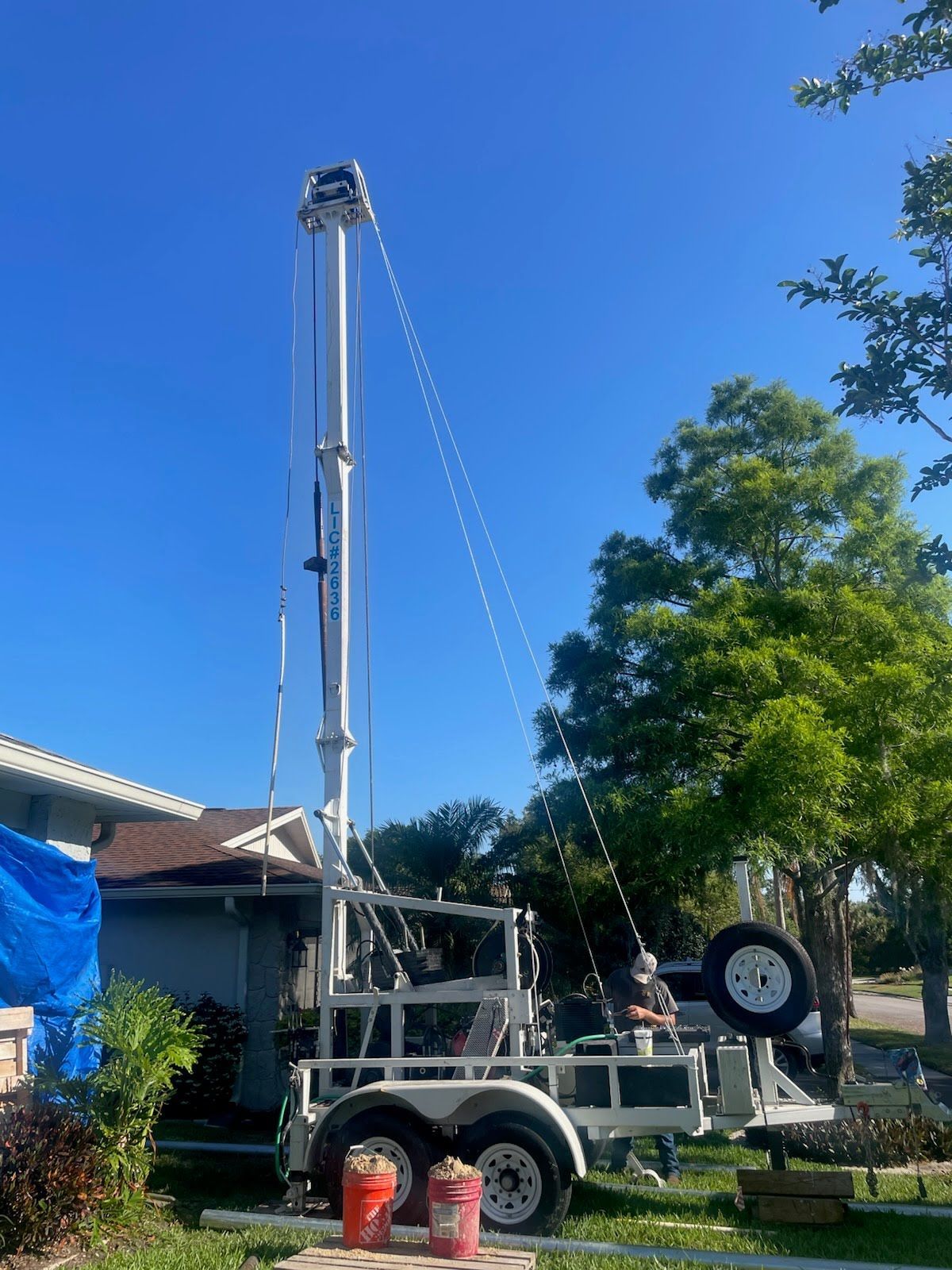Blog

Understanding Florida's Aquifers Florida’s unique geology has blessed the state with abundant water resources. Beneath the surface lies an intricate system of aquifers that serve as a critical lifeline for residents, businesses, and ecosystems. In this blog, we will explore the role of aquifers in Florida's water supply, their significance in well drilling, and the importance of the Floridan Aquifer in meeting residential and commercial needs. What Are Aquifers? Aquifers are underground layers of permeable rock, sediment, or soil that hold and transmit water. They act as natural reservoirs, storing water that is accessed through wells or natural springs. Aquifers can vary in size, depth, and water quality, depending on their geological composition and location. In Florida, the state's aquifers are particularly vital due to the porous limestone bedrock that allows water to flow and accumulate. This natural feature has made Florida one of the most water-rich states in the U.S., with aquifers supplying nearly 90% of the state's drinking water. (Source: Florida Department of Environmental Protection) Florida's Major Aquifers Florida is home to several aquifers, but the most notable ones include: The Floridan Aquifer The Floridan Aquifer is one of the largest and most productive aquifers in the world, spanning over 100,000 square miles beneath Florida and parts of Georgia, Alabama, and South Carolina. It supplies water to more than 10 million people and supports various industries, including agriculture and tourism. Depth : The aquifer’s depth ranges from 100 feet to over 2,000 feet below the surface. Output : It discharges approximately 1 billion gallons of water per day through springs, wells, and other outlets. (Source: U.S. Geological Survey) Significance : The Floridan Aquifer is the primary source of drinking water for Central and North Florida, as well as a key resource for commercial and industrial operations. The Biscayne Aquifer Located in South Florida, the Biscayne Aquifer is shallower and more vulnerable to contamination than the Floridan Aquifer. It primarily serves Miami-Dade, Broward, and Palm Beach counties. The Sand-and-Gravel Aquifer Found in the western Panhandle, this aquifer provides water for local residents and agricultural activities. It is less extensive than the Floridan and Biscayne aquifers but remains a vital resource for the region. The Role of Aquifers in Florida's Water Supply Aquifers play a crucial role in Florida’s water management system. They supply: Drinking Water : Nearly all of Florida’s potable water comes from aquifers. Irrigation : Agriculture depends heavily on aquifer water, especially during dry seasons. Industrial Use : Manufacturing and energy production rely on consistent access to grou ndwater. Florida’s unique hydrology also supports more than 1,000 natural springs, the largest concentration of springs on Earth. These springs, fed by aquifers, attract millions of visitors annually and contribute significantly to the state’s economy. Aquifers and Well Drilling in Florida Well drilling is a practical and efficient way to access water stored in aquifers. The process involves drilling through layers of soil and rock to reach the aquifer below. Factors such as the depth of the aquifer, water quality, and regional regulations influence the drilling process. Residential Wells : Homeowners in rural and suburban areas often rely on private wells to access the Floridan or Biscayne Aquifers for clean drinking water. Commercial Wells : Businesses, particularly in agriculture and industry, use high-capacity wells to meet their water needs. Regulations : Florida requires permits for well drilling to ensure sustainable water use and protect aquifer health. (Source: Florida Water Management Districts) According to the Florida Department of Environmental Protection, maintaining aquifer health requires sustainable practices and robust water management policies. Conclusion Florida’s aquifers are a cornerstone of the state’s water supply, supporting millions of residents and countless businesses. The Floridan Aquifer, in particular, plays a critical role in ensuring access to clean, reliable water. Understanding and protecting these underground reservoirs is essential for Florida’s future. By promoting sustainable practices and responsible well drilling, we can safeguard these invaluable resources for generations to come. Contact us at A+ Pump and Well for responsible well drilling services , whether residential or commercial. Reach out to our team today.
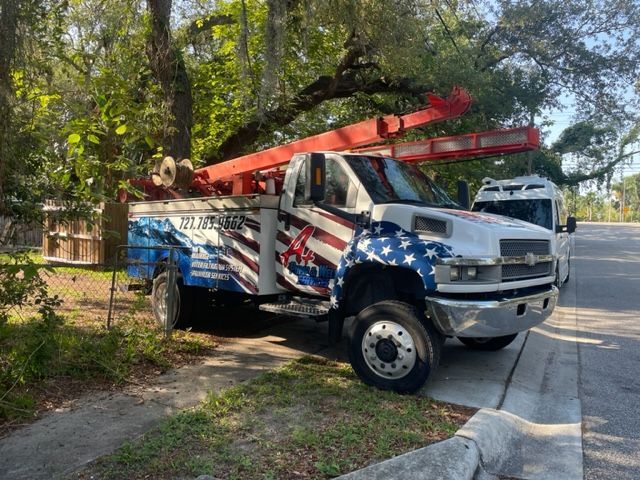
From Source to Sink: A Journey of Your Water The Underground Source Your water's journey begins beneath the earth's surface. It resides in underground layers of rock or sediment called aquifers. A well, a hole drilled into the ground, accesses this water source. The Well Pump: Bringing Water to the Surface To bring water from the well to your home, a pump is essential. Submersible Pump : This type of pump is lowered into the well and draws water up to the surface. Jet Pump: Located above ground, a jet pump uses a jet of water to create suction and draw water from the well. The Pressure Tank: Storing and Regulating Water Flow Once water reaches the surface, it's stored in a pressure tank. This tank ensures a consistent water flow to your home, even during peak usage times. A pressure switch regulates the pump's operation, turning it on and off as needed. The Distribution System: Delivering Water to Your Home The final step in the journey is the distribution system. Pipes carry water throughout your home, supplying it to faucets, showers, toilets, and other fixtures. Essential Services for a Smooth Water Journey To keep your well water system functioning optimally, consider these essential services: Well Inspection: Regular inspections can identify potential issues like corrosion, leaks, or mineral buildup. Pump Maintenance: This includes lubricating moving parts, checking electrical connections, and replacing worn components. Water Testing : Regular testing ensures your water is safe and free from contaminants. Water Treatment: If necessary, water treatment systems can remove impurities like iron, manganese, or hardness minerals. Pressure Tank Maintenance: Checking pressure gauges, replacing faulty valves, and ensuring proper air pressure. By understanding the intricate journey of your water and investing in regular maintenance, you can enjoy a reliable and clean water supply for years to come. Contact A+ Pump and Well Services today.
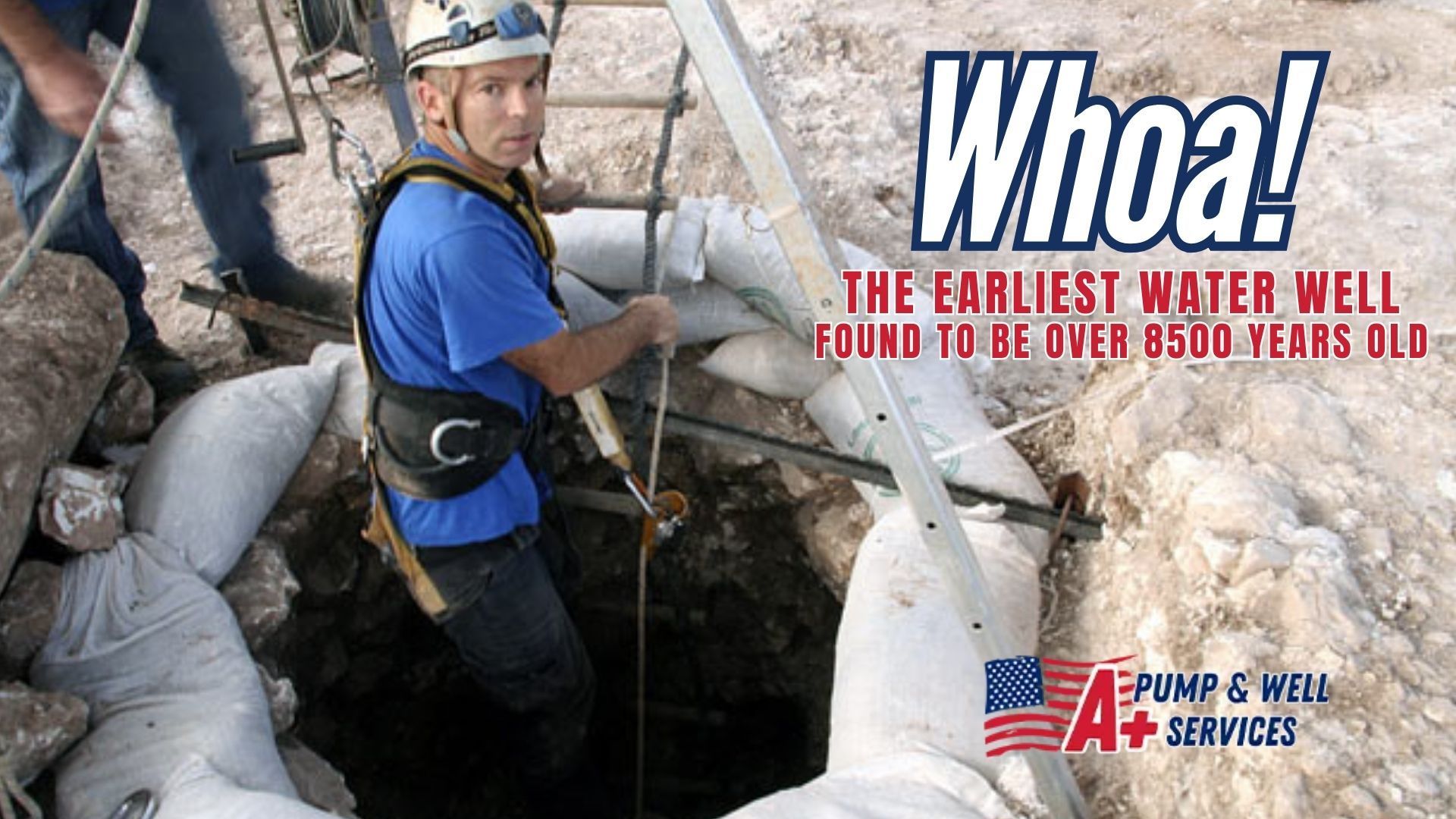
Water wells are one of humanity’s most significant inventions, providing access to the earth’s most vital resource—water. From ancient hand-dug wells to today’s modern drilling techniques, the history of water wells is a fascinating journey that highlights human innovation, resilience, and our unbreakable connection to water. Let’s explore the evolution of water wells and their enduring importance through the ages. The Earliest Water Wells: Over 8,500 Years Ago The earliest known water wells date back over 8,500 years to the Neolithic period. One remarkable example is the well discovered at Atlit Yam , a submerged Neolithic village off the coast of Israel. This stone-lined well provided water for a community engaged in early agriculture, supporting crops, livestock, and daily needs. Another ancient well, found in Cyprus, is believed to be approximately 10,000 years old . These early wells were dug using basic tools and lined with stones or timber to prevent collapse, demonstrating advanced ingenuity for the time. Wells in Ancient Civilizations As civilizations advanced, so did their water management techniques. Wells became an integral part of life, especially in regions where surface water was scarce. Mesopotamia (4,000–2,500 BCE): The Mesopotamians dug wells to irrigate their crops, relying on the Tigris and Euphrates rivers. They often used simple pulley systems to lift water. Ancient Egypt (3,000 BCE): Wells supported agriculture along the Nile River, particularly during dry seasons. The shaduf, a hand-operated device for lifting water, was a common tool. Indus Valley Civilization (2,500 BCE): This civilization, known for its advanced urban planning, incorporated wells into their cities, providing residents with easy access to water. Medieval Wells and Innovations During the medieval period, wells became more sophisticated. Communities often dug deeper to reach more reliable water sources, using new tools and techniques to improve efficiency. Europe: Castles and fortified towns often included deep wells to ensure a water supply during sieges. These wells were dug by hand, sometimes taking years to complete. Islamic Golden Age : Scholars and engineers developed advanced water-lifting technologies, including the use of gears and animal-powered systems, to access deeper water sources. The Rise of Modern Wells The Industrial Revolution brought significant advancements to well construction and water access. Drilling technology replaced manual digging, enabling wells to reach much deeper aquifers. This era also saw the development of pumps, which made extracting water more efficient. Hand Pumps (19th Century): Hand-operated pumps became common in rural areas, making it easier to draw water from shallow wells. Deep Drilling (20th Century): Innovations in drilling technology allowed wells to reach hundreds of feet below the surface, tapping into deep aquifers that could sustain growing populations and agriculture. Water Wells in Today’s World Modern wells are a testament to centuries of progress. Using advanced machinery, wells today can be drilled quickly and efficiently, reaching depths unimaginable to our ancestors. Key innovations include: Submersible Pumps: These pumps operate underwater, providing efficient and reliable water extraction. Well Linings and Casings: Modern materials like PVC and steel protect wells from contamination and collapse. Water Testing and Filtration: Technology allows for regular testing and filtration systems, ensuring clean and safe water for consumption. The Importance of Water Wells Today Water wells continue to play a critical role in providing water for billions of people worldwide. In rural areas, private wells are often the primary source of drinking water. Wells also support agriculture, industry, and emergency water supplies during droughts or natural disasters. As water becomes an increasingly precious resource, sustainable well management and advanced drilling technologies will ensure access to clean water for future generations. A Testament to Human Ingenuity The history of water wells is a testament to human ingenuity and adaptability. From ancient hand-dug wells to today’s sophisticated drilling systems, wells have been a cornerstone of survival and progress. Their story reminds us of our deep connection to water and the enduring need for sustainable water management. If you’re considering installing or maintaining a well, contact A+ Pump and Well Services . With our expertise, we’ll help you tap into this timeless resource and ensure a reliable water supply for your home or business.

The Benefits of Shallow Wells in Florida’s Sandy Soil: A Clean, Reliable Solution for Irrigation In Florida, maintaining a green lawn, lush garden, or productive farm can be challenging, especially when relying solely on municipal water supplies. High water bills, potential restrictions during dry seasons, and environmental concerns all add to the complexity. For many Floridians, the answer lies right beneath their feet: shallow wells. Thanks to Florida’s naturally sandy soil, shallow wells can provide an efficient and eco-friendly water source for non-potable uses like irrigation. Here’s why Florida’s soil makes shallow wells an ideal solution and how you can take advantage of this resource. Why Florida’s Sandy Soil Makes Shallow Wells Ideal for Irrigation Florida’s soil is unique. Its sandy, porous composition allows rainwater to filter naturally as it percolates down to the aquifers below. This natural filtration helps create cleaner water in shallow wells compared to other types of soil, which may contain more clay or silt that can carry pollutants and impurities. In a shallow well system, water is drawn from the surficial aquifer, just below the surface. Florida’s sandy soil acts as a natural filter, removing many contaminants and making shallow well water a safer choice for non-potable uses, especially irrigation. This naturally filtered water reduces the need for chemical treatments, making it a convenient, low-cost option for homeowners and farmers alike. The Advantages of Using a Shallow Well for Irrigation in Florida Using a shallow well has several benefits beyond water filtration: Cost Savings: Shallow wells can significantly reduce water bills by providing an alternative to municipal water for irrigation, helping homeowners save money. Sustainability: Drawing water from a shallow well reduces the demand on public water supplies, which is crucial in Florida’s often drought-prone climate. Less Restriction During Dry Spells: With a private shallow well, you won’t face the same water restrictions that apply to municipal water during droughts. Eco-Friendly Solution: Relying on well water for irrigation reduces the need for chemically treated municipal water, which benefits both plants and the environment. The combination of Florida’s sandy soil and shallow wells provides a steady, cost-effective water source, especially beneficial for large lawns, gardens, and agricultural applications. How to Maintain a Shallow Well for Optimal Water Quality While Florida’s sandy soil provides natural filtration, it’s still essential to maintain your shallow well system to ensure water quality and long-term reliability. Regular Water Testing: Even for non-potable use, test your shallow well water periodically for pH, bacteria, and mineral content. Sandy soil does filter contaminants, but it’s still wise to monitor water quality. Protect Against Contamination: Keep hazardous materials like fertilizers, pesticides, and gasoline away from the well site. Because shallow wells are closer to the surface, they’re more vulnerable to contamination from nearby activities. Inspect the Well Cap and Screen: Ensure the well cap is tightly secured to prevent insects, debris, and small animals from entering the well. Additionally, the screen should be in good condition to keep out sand particles. Consider a Sediment Filter: Florida’s sandy soil may occasionally allow fine particles to enter the well. Installing a sediment filter can prevent clogs and keep your irrigation equipment running efficiently. Maintaining your well ensures it continues to deliver clean water, safeguarding your irrigation system and plants. Why Shallow Wells Are a Smart Choice for Florida Homeowners For Florida homeowners and landowners, shallow wells offer an affordable, eco-friendly solution for irrigation. By tapping into the naturally filtered water just beneath the surface, you can significantly reduce your dependence on municipal water, cut costs, and minimize environmental impact. Plus, a shallow well requires less drilling and infrastructure than deeper wells, making it a quicker, more cost-effective option for those in need of irrigation. Contact A+ Pump and Well for Your Shallow Well Needs If you’re ready to explore the benefits of a shallow well for your Florida property, contact A+ Pump and Well Services . Our team has the expertise to install, maintain, and optimize shallow wells, helping you enjoy a steady water supply for irrigation. Reach out today for a consultation and start experiencing the benefits of your own well water system. Make your irrigation sustainable and affordable with A+ Pump and Well – your partner in well water solutions!
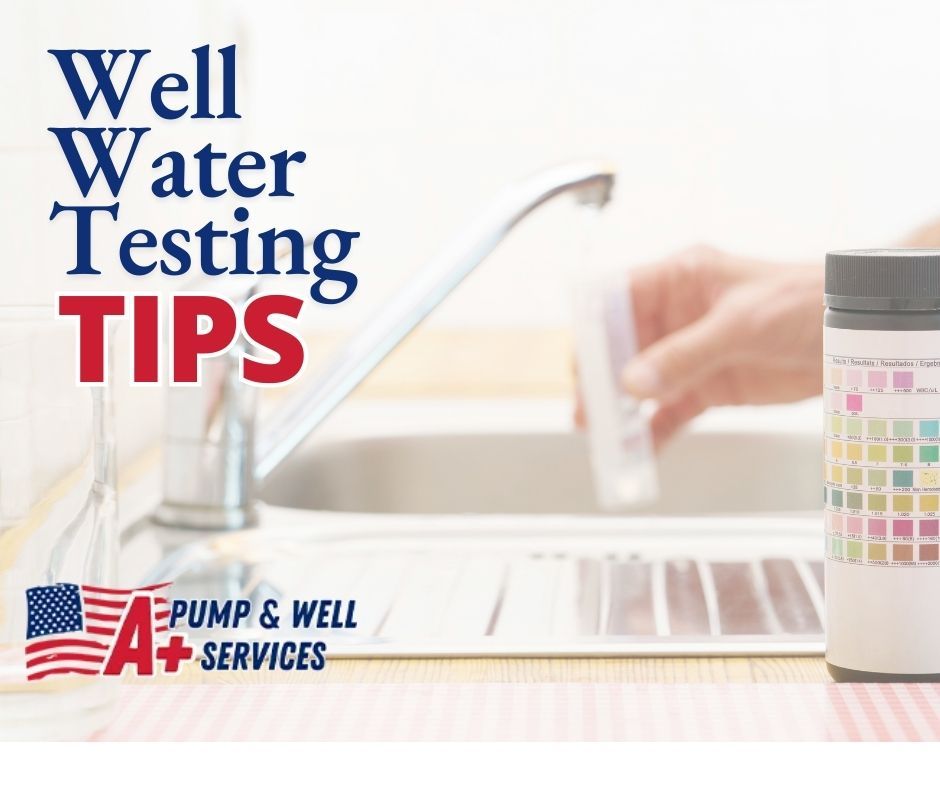
How Often Should You Test Your Well Water? For most well owners, testing at least once a year for bacteria, nitrates, and pH levels is a great rule of thumb. However, certain situations may require more frequent testing: If you notice anything unusual, it’s wise to test immediately to identify possible contaminants. Sudden Changes in Taste, Smell, or Color: After Flooding or Nearby Construction: Environmental shifts can impact groundwater quality, especially if there has been significant rain or nearby construction. Following Well Repairs: Any time you’ve had work done on your well, test afterward to ensure it remains free from contamination. Regular testing can help you identify issues early and prevent them from affecting your water quality. For a thorough inspection or expert advice on testing, our team at A+ Pump and Well Services is ready to assist. Step 1: Choose Your Testing Method When it comes to testing your well water, you have two main options: home test kits or professional laboratory testing. Home Test Kits: These are convenient and readily available at hardware stores or online, allowing for quick assessments of basic factors like pH, hardness, and certain contaminants. However, for the most accurate results, professional testing is recommended. Laboratory Testing: Certified labs can analyze a broader range of contaminants, including heavy metals, bacteria, pesticides, and volatile organic compounds (VOCs). Lab tests provide precise, detailed reports and are a better choice if you have concerns about water safety. Step 2: Collect a Water Sample Correctly Collecting a clean, accurate sample is essential for reliable test results. Here’s how to do it: Select a Clean Tap: Choose a cold-water tap closest to the well. Avoid faucets with filters or softeners, as these can alter the sample. Run the Water First: Let the water run for 2-3 minutes to flush out standing water in the pipes, giving you a sample that truly reflects the well’s quality. Handle the Container Carefully: If you’re using a lab’s sample kit, follow the instructions for filling and handling. Many labs provide sterile containers that should be handled with care to avoid contamination. Step 3: Interpret Your Results Once you have your results, it’s time to understand what they mean for your water quality. Home Kit Results: Most home kits include a chart that explains color changes or strip readings, providing ranges for different contaminants and safe thresholds. Lab Report Results: If you opted for lab testing, the report will detail contaminant levels and indicate if any exceed safe limits, making it easier to understand where your water quality stands. Step 4: Take Action Based on Your Results If your test results reveal contaminants above safe levels, it’s time to take action. Here are a few potential solutions: Bacteria Issues: If bacteria levels are elevated, consider disinfection options like chlorination or a UV water purifier to ensure safe, clean water. Heavy Metals or Hard Water: If your well contains high levels of heavy metals or hardness,consider installing a water softener or reverse osmosis system to remove contaminants and improve water quality. A+ Pump and Well Services offers professional water treatment solutions tailored to your needs, whether you’re dealing with bacteria, hardness, or other water quality concerns. Annual testing is a smart step for every well owner to ensure a clean, safe water supply. If you notice any changes in your water or need help with testing and treatment options, A+ Pump and Well Services is here to help you maintain a healthy well system. From testing to treatment and regular maintenance, we have the expertise to keep your water safe year-round. Ready for a water check-up? Contact A+ Pump and Well Services today to schedule your annual testing and ensure your well is in top shape!
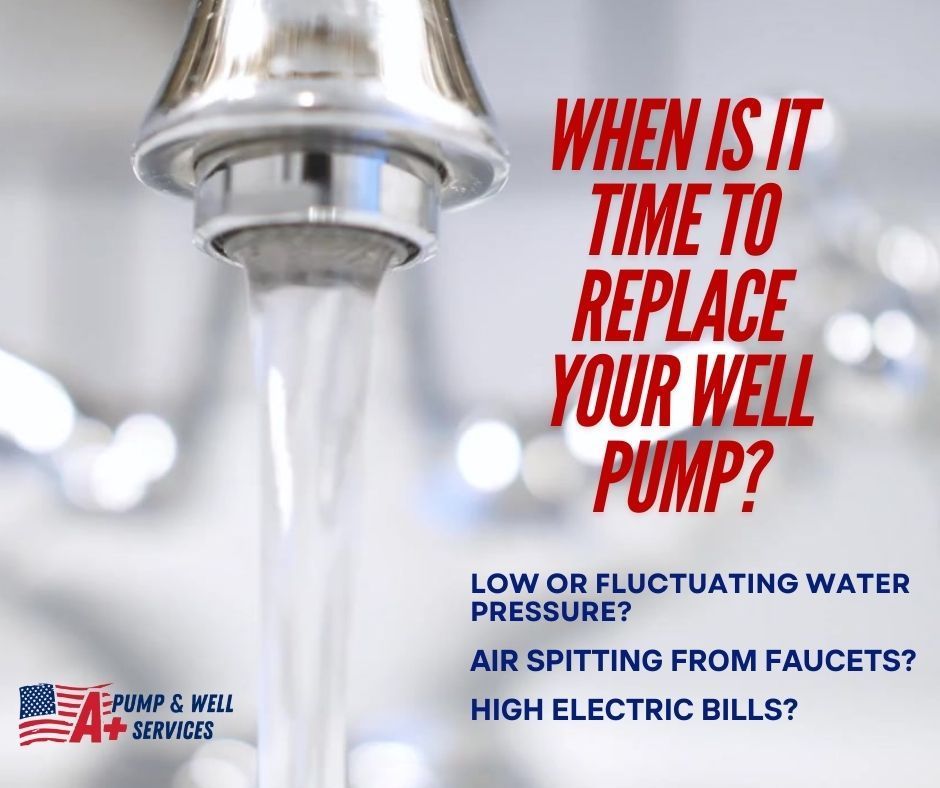
Does Your Well Pump Need Replaced? A well pump is the heart of your water system, drawing groundwater into your home for use in everything from cooking to bathing. Like any mechanical system, however, it doesn’t last forever. Understanding when it’s time to replace your well pump can save you from unexpected water issues, costly repairs, and potential damage to your entire water system. In this blog, we’ll dive into the signs that indicate it’s time to replace your well pump and why timely replacement is so important. Signs You Need a Well Pump Replacement Recognizing the warning signs of a failing well pump can help you avoid inconvenient and expensive water disruptions. Here are some of the most common signs that your well pump may need replacing: Low or Fluctuating Water Pressure: If you notice a sudden drop in water pressure or inconsistent flow, your pump may be struggling to deliver water efficiently. This is often one of the first indicators that your pump is on its way out. Frequent Cycling (On and Off): A well pump that turns on and off more frequently than usual is a red flag. This issue, known as "short cycling," typically points to a problem with the pressure switch or a failing pump. Air Spitting from Faucets: If air is spurting out of your faucets, your well pump may be drawing in air instead of water, often due to a malfunction or a drop in the water table. Unusual Noises: Grinding, clicking, or humming noises coming from the pump can indicate mechanical wear or damage. High Electric Bills: A well pump that is nearing the end of its life may have to work harder and longer to pull water, causing your electric bills to spike unexpectedly. Why Well Pump Replacement Is Important Delaying a necessary well pump replacement can lead to a number of serious problems, including: Water Disruptions: A failing pump will eventually stop working, leaving your home without running water for daily needs such as drinking, cooking, and bathing. Damage to the Water System: Continuing to use a worn-out pump can damage other components of your well system, such as the pressure tank or electrical wiring. These additional repairs will make the replacement process even more costly. Water Contamination: A malfunctioning pump may not properly seal your well, leading to contamination risks from surface water or debris. Increased Repair Costs: If you wait until your pump fails entirely, the cost of emergency repairs and replacement can be much higher than scheduling a replacement at the first sign of trouble. How Long Do Well Pumps Typically Last? Well pumps are built to last, but their lifespan depends on several factors, including the type of pump, water quality, and how often the pump is used. On average: Submersible Pumps: 8-15 years Jet Pumps: 10-15 years Centrifugal Pumps: 10 years Regular maintenance and water testing can help extend the life of your well pump, but once you start experiencing problems, it’s often more cost-effective to replace the pump than to keep repairing it. Factors That Affect Well Pump Lifespan There are several factors that can impact the lifespan of your well pump. Understanding these can help you determine when it’s time to plan for a replacement: Water Quality: High levels of sediment or minerals like calcium and magnesium can cause the pump to work harder, leading to premature wear. Size of the Pump: A pump that’s too small for the demand of your household will burn out faster due to overuse. Depth of the Well: Deeper wells require the pump to work harder to deliver water, which can reduce its lifespan. Frequency of Use: If you have a large household or rely heavily on well water, the pump will cycle more frequently, leading to faster wear and tear. Why It’s Best to Hire a Professional for Well Pump Replacement Replacing a well pump is not a DIY project. It requires specialized knowledge and equipment to ensure the job is done correctly. Here’s why you should always hire a licensed professional for well pump replacement: Safety Concerns: Well pumps involve electrical wiring and plumbing systems, both of which can be hazardous if handled improperly. Proper Sizing and Installation: A professional will ensure your new pump is properly sized for your home’s water demands, avoiding future problems. Warranty Protection: Most pumps come with manufacturer warranties, but these are often voided if the pump isn’t installed by a licensed contractor. Choosing the Right Well Pump for Replacement When it’s time to replace your well pump, you have options. The type of pump you choose should depend on your well’s depth, the size of your household, and your budget. Common types include: Submersible Pumps: These are placed deep inside the well and are ideal for deeper wells. They are energy-efficient and provide consistent water pressure. Jet Pumps: Typically used for shallow wells, jet pumps are mounted above ground and are easy to access for maintenance. Centrifugal Pumps: These are ideal for wells that are less than 25 feet deep and are simple to install and maintain. A professional can help you choose the best pump for your specific needs. Maintaining Your Well Pump to Extend Its Lifespan Once your new well pump is installed, regular maintenance is key to maximizing its lifespan and performance. Here’s what you can do: Schedule Annual Inspections : Have a professional inspect your well system once a year to catch any issues early. Test Your Water Quality: Regular water testing e nsures that sediment and mineral buildup won’t prematurely wear down your pump. Monitor Water Pressure: Keep an eye on your water pressure. If you notice fluctuations, it could be a sign that your pump needs attention. Contact A+ Pump & Well For Expert Service A well pump is a critical part of your home’s water system, and knowing when to replace it can save you time, money, and hassle. If your well pump is showing signs of wear, don’t wait for it to fail. Replacing it at the right time will ensure your water supply remains uninterrupted and clean. At A+ Pump & Well, we specialize in well pump replacement and maintenance. Contact us today for expert advice and service to keep your water system running smoothly.
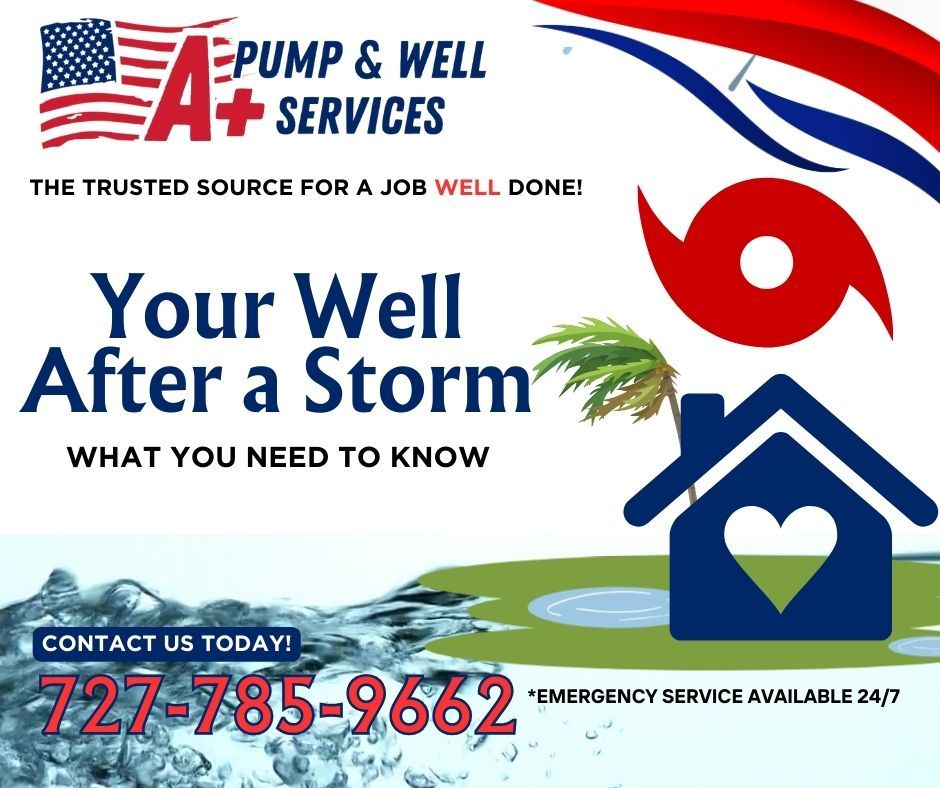
After the Storm: Essential Well Maintenance to Protect Your Water Supply After a severe storm, well owners face unique challenges in ensuring their water supply remains safe and clean. Storms, especially those that bring heavy rain, flooding, and strong winds, can cause significant damage to well systems, potentially leading to water contamination. To protect your family’s health and avoid costly repairs, it’s essential to conduct a thorough well inspection and maintenance as soon as it’s safe to do so. Here’s a guide to what well owners should do after a storm to safeguard their water supply: Inspect the Wellhead for Damage After the storm passes, one of the first things you should do is inspect your wellhead and the surrounding area. Check for any signs of damage caused by flying debris, falling branches, or strong winds. Look for cracks, broken seals, or any other visible damage to the wellhead or casing. Any damage could allow contaminants to enter your well, so it’s important to fix these issues right away. Tip: Even if you don't notice any visible damage, it's a good idea to have a professional well contractor inspect your wellhead to ensure it's structurally sound. Test Your Water for Contaminants Floodwaters can carry bacteria, chemicals, and other harmful contaminants that can seep into your well, especially if your wellhead was submerged or damaged. After a storm, it’s critical to have your water tested by a certified laboratory for bacteria like E. coli, coliform, and other pollutants. Until you know your water is safe, avoid using it for drinking, cooking, or bathing. Boiling the water can kill bacteria, but it won't remove chemicals, so it's best to wait until your water has been tested and deemed safe for use. Flush and Disinfect the System If floodwater has infiltrated your well, it may need to be flushed and disinfected to remove contaminants. This process typically involves shocking the well with chlorine and allowing the solution to circulate through the system. Afterward, the system must be flushed thoroughly to remove any remaining chemicals before the water is safe for use. This is a task best handled by a professional who can ensure the well is properly disinfected and back to normal operation. Check Electrical Components If you lost power during the storm or experienced electrical surges, there’s a chance your well pump or other electrical components may have been damaged. Before turning the power back on, inspect your well pump for signs of damage. If you're unsure, it's always a good idea to have a professional check the pump and electrical system to prevent further damage or safety hazards. Schedule a Professional Well Inspection Even if everything seems fine, scheduling a professional well inspection after a storm is a smart move. Well professionals can identify potential problems you might not notice, such as damage to underground components or contamination risks. A comprehensive inspection will give you peace of mind and ensure your well is functioning correctly and safely. Why It’s Important to Act Quickly Contaminated water poses serious health risks, including gastrointestinal illnesses, infections, and exposure to harmful chemicals. The longer a contaminated well is left untreated, the greater the risk to your family’s health and safety. Acting quickly to address any damage or contamination will not only protect your well but also prevent more costly repairs down the line. How A+ Pump & Well Can Help At A+ Pump & Well, we specialize in well inspections, water testing, and maintenance services to ensure your well is functioning properly after a storm. Our team of experts can quickly assess any damage, test your water for contaminants, and provide solutions to keep your water safe and clean. 💧 Services We Offer Post-Storm: Comprehensive well inspections Water testing for contaminants Well system disinfection and flushing Electrical and pump system checks If your well has been impacted by the recent storm, don’t wait to take action. Reach out to A+ Pump & Well today for expert assistance. We’re here to help you get your well back in working order and ensure your water is safe for you and your family. 📞 Contact us today to schedule a service
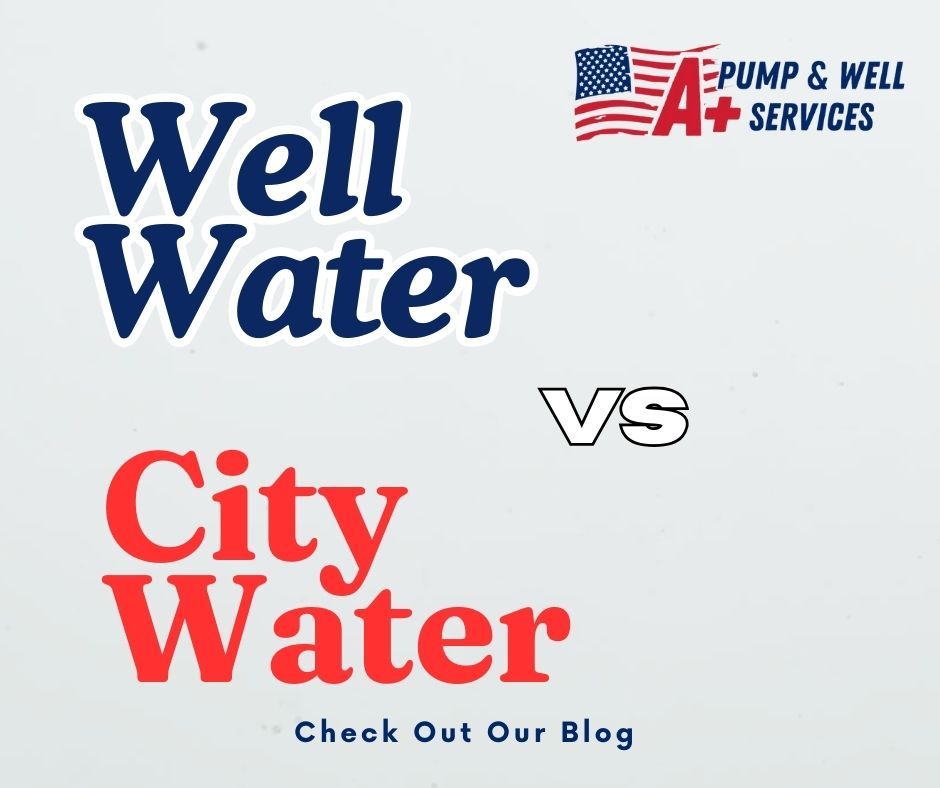
Well Water vs. City Water: Key Differences and Why Well Maintenance is Critical As a Florida resident, you may be considering whether to rely on well water or stick with city water for your home. Each option comes with its own set of benefits, but if you're looking for quality, sustainability, and long-term savings, well water stands out as a fantastic choice. At A+ Pumps and Wells , we believe in the power of well water and the importance of proper maintenance to ensure it remains a reliable source for your household. Let's dive into the key differences between well water and city water, and why well maintenance is critical to enjoy the full benefits. The Key Differences Between Well Water and City Water Source of Water Well Water: Drawn directly from the ground, well water taps into natural underground aquifers, giving you access to a renewable water source. City Water: City water comes from various sources, such as rivers, lakes, or reservoirs. It undergoes extensive treatment before being delivered to your home through a municipal system. Cost Well Water: One of the biggest advantages of well water is the cost savings. After the initial investment in a well system, you’ll avoid monthly water bills and can enjoy a virtually free water source. City Water: With city water, you pay for every gallon consumed, often leading to high utility bills. Prices can fluctuate based on usage, and water restrictions may apply during droughts or shortages. Quality and Taste Well Water: Florida’s well water is known for its fresh and mineral-rich taste. Unlike city water, it doesn’t contain added chemicals like chlorine or fluoride, which many people find enhances its purity and taste. City Water: While city water is treated to meet safety standards, it often contains additives such as chlorine to prevent contamination. These chemicals can affect the taste and quality, and sensitive users may even notice skin or hair issues after prolonged exposure Why Regular Well Maintenance is Critical Why Regular Well Maintenance is Critical Now that we’ve established the benefits of well water, let’s focus on why regular maintenance is key to keeping your well in top shape. Ensure Water Quality Without regular maintenance, your well water could become contaminated by bacteria, sediment, or other pollutants. Annual water testing and system checks ensure that your water remains clean and safe for drinking. Routine inspections can help catch small issues, such as pump inefficiency or declining water pressure, before they turn into expensive repairs. With regular care, you can extend the life of your well pump and avoid sudden breakdowns. Protect the Environment A well-maintained system operates efficiently, preventing overuse of your groundwater supply and minimizing energy consumption. Regular maintenance helps protect Florida’s aquifers while ensuring that your well continues to provide for your household needs. Trust A+ Pumps and Wells for Expert Well Maintenance At A+ Pumps and Wells , we are committed to providing top-tier well services for Florida residents. Our team of experts is here to ensure that your well operates at its best, delivering safe, clean, and reliable water to your home. From regular maintenance to emergency repairs, we've got you covered. If you're ready to experience the benefits of well water with the peace of mind that comes from professional care, give us a call today! Let us help you enjoy all the advantages of well water, without the worry. Contact Us today for expert and dependable service.

A residential water well cover is an essential part of the well system, helping to keep out debris, animals, and other contaminants that can compromise the quality of your water. Checking the cover regularly is an important part of maintaining your well system and ensuring that your water is clean and safe for consumption. In this blog post, we'll outline some key steps for checking a residential water well cover. Step 1: Locate the Well The first step is to locate your well. This may require some detective work, as wells are often hidden in obscure locations, such as in a closet or under a deck. Look for a small metal or plastic cap protruding from the ground, or follow the water pipes leading from your home to the well site. Step 2: Remove the Cover Once you have located the well, remove the wll cover to inspect the inside of the well. Depending on the type of cover, this may involve using a special tool or simply unscrewing the well cover. Be careful when removing the well cover, as it may be heavy or difficult to maneuver. In general, you should always use a certified technician to remove a cover. If you try to remove the cover yourself, you risk breaking the cover, contaminating the water well, and incurring additional costs to repair the cover and potential decontaminate the well. Step 3: Check the Condition of the Cover Once the cover is removed, inspect it for any damage or wear. Look for cracks, chips, or other signs of damage that could allow debris or contaminants to enter the well. If the cover is damaged, it should be replaced as soon as possible. Step 4: Check the Well Casing Inspect the well casing, which is the pipe that extends from the ground into the well. Look for any signs of damage, such as cracks or leaks, that could allow contaminants to enter the well. If the well casing is damaged, it should be repaired by a qualified well contractor. Step 5: Clean the Well If you notice any debris or sediment inside the well, use a well brush to scrub the sides and bottom of the well. This will help to remove any built-up sediment or other materials that could impact the quality of your water. Step 6: Replace the Cover Once you have inspected the well and cleaned it if necessary, replace the cover and secure it in place. Make sure that the cover is properly seated and flush with the well, as this will help to prevent debris or other contaminants from entering the well. Again, in general, you should always use a certified technician to remove & replace a cover. If you try to remove & replace the well cover yourself, you risk breaking the cover, contaminating the water well, and incurring additional costs to repair the cover and potential decontaminate the well. Checking a residential water well cover is an important part of maintaining your well system and ensuring that your water is clean and safe for consumption. By following these steps and scheduling regular inspections and maintenance, you can enjoy a reliable source of clean water for your household needs. If you need assistance with well maintenance or repairs, contact A+ Pump & Well Services to ensure that your well system is in good hands. Don't let a malfunctioning well disrupt your daily routine or put your health at risk. Contact A+ Pump & Well Services today at 727.785.9662 to schedule an appointment and get your well back in working order. We are dedicated to providing excellent customer service and ensuring that you have access to safe and reliable water.

